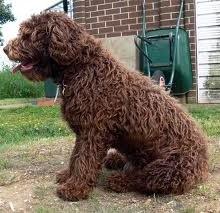Spanish Water Dog
Lifestyle Needs

The Spanish Water Dog is rather rare in the UK. He is a small to medium sized, curly coated dog, who, as his name suggests is rather at home in water. It is thought he was used to retrieve game from water. He is typically good natured and lively and needs plenty on exercise. His coat should be trimmed from time to time and groomed regularly to keep free from dirt, dust and tangles.
Genetic Diversity
(Known as Coefficient of Inbreeding: 'COI'. It should be as low as possible.)
The UK Kennel Club breed average COI is 7.2% - See 'A Beginners Guide to COI'
Gene Pool Size
(Known as Effective Population Size: 'EPS')
44.9
EPS is a measure of how many individuals are contributing genetically to a breed population. It is a measure of the size of the gene pool in a breed. Lower than 100 is considered critical by conservationists and below 50 brings a breed close to extinction. For more information see the Kennel Club article.
Health and Welfare Problems due to Conformation
(Body shape and physical characteristics)
- Hair will fall over the eyes and obscure vision if not trimmed
- An excess of hair around the ears could cause ear problems and/or skin infections
- An excess of hair around the feet could cause matting, soreness or skin infections if not checked regularly
BVA/KC Health Schemes: www.bva.co.uk/chs
- Hip dysplasia: Breed 5 year mean score 13.8 (parents should be lower)
- Elbow dysplasia: score should be as low as possible ideally 0:0
- Eye Disease: Goniodysgenesis / Primary glaucoma (G) (annual testing)
Estimated Breeding Values (EBVs) : No EBVs are currently available for this breed
www.thekennelclub.org.uk/about-ebvs
DNA Tests Available
DogWellNet and IPFD Harmonisation of Genetic Testing for Dogs (HGTD)
www.dogwellnet.com/breeds
- Progressive Retinal Atrophy (prcd PRA)
- Hyperuricosuria (HUU)
- Neuroaxonal Dystrophy
Availability of a DNA test does not mean that it is always necessary or even desirable for breeders to use this test.
Other Breed-Specific Health Screening Schemes
- Bitches under 2 years not to produce litter
- Bitches not to produce more than one litter in a 12 month period
Ask the breeder to show you the certificates for the above tests/screening for both parents. If any of the above tests have not been considered necessary by the breeder (and there may be good reasons), ask her to explain why.
Other Diseases Reported
(For which there are currently no genetic or screening tests for sire or dam)
- Glaucoma
- Congenital hypothyroidism with Goiter (GHC)
- Leishmaniasis
Ask the breeder about the medical history of the parents, grandparents and great grandparents. Consider carefully whether to purchase a puppy if some of these or other diseases are in the family line.
Ask about the breeder’s policy in cases of serious genetic diseases occurring to your puppy in later life. Good breeders will request to be informed of such events in order to improve future breeding decisions.
You are strongly advised to buy from a breeder who uses (or is prepared to use) the AWF Puppy Contract and Puppy Information Pack (PIP): www.puppycontract.org.uk
The breeder should also be familiar with the CFSG/DBRG Code of Practice for Dog Breeding
Or the Kennel Club’s Assured Breeders Scheme Standard and Guidance:
Standard PDF | Guidance PDF